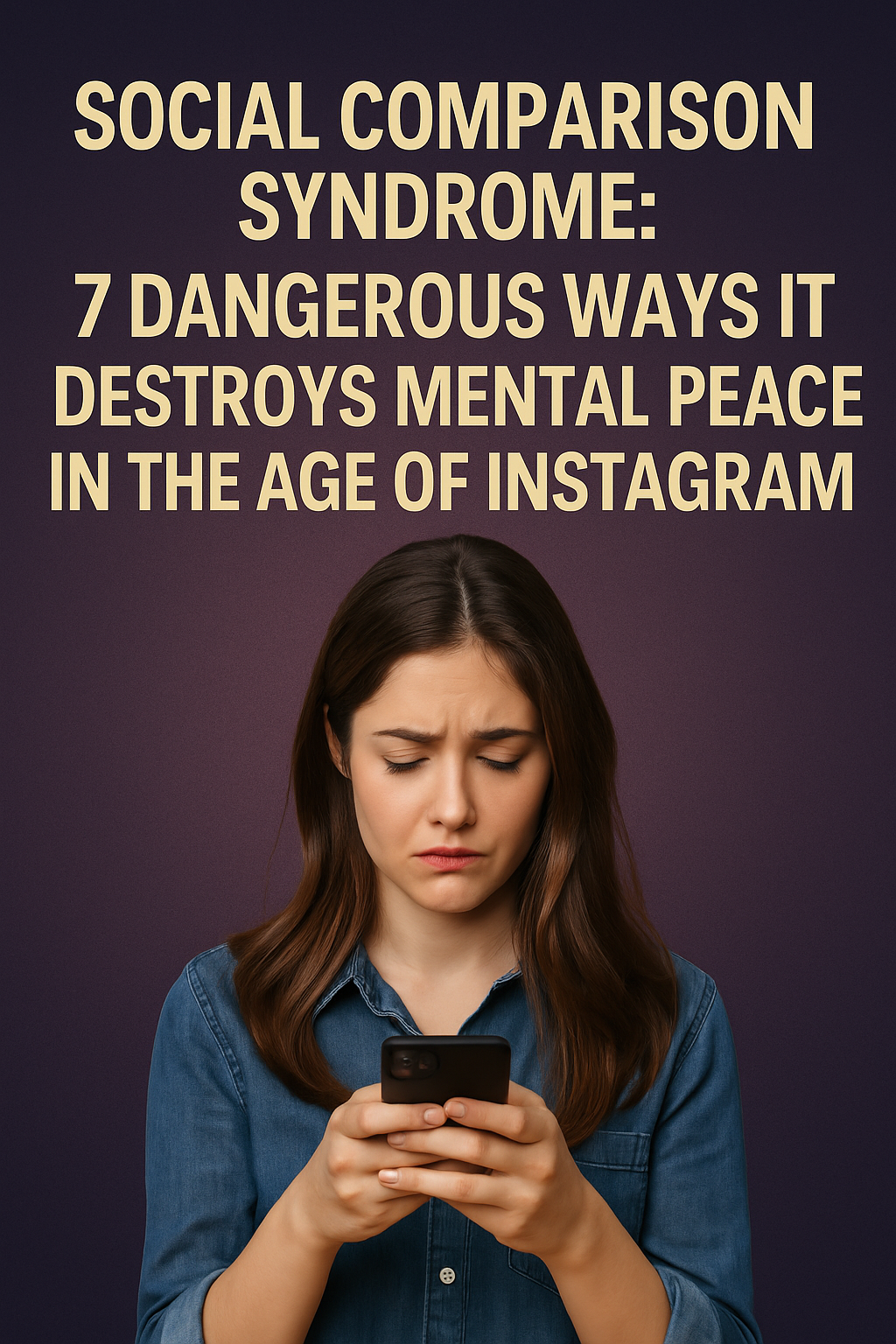
Social Comparison Syndrome: 7 Dangerous Ways It Destroys Mental Peace in the Age of Instagram
Introduction: The Hidden Dangers of Constant Comparison
In today’s hyper-connected digital world, platforms like Instagram and Facebook have become central to our daily lives. While they provide entertainment, social connection, and inspiration, they also come with a darker side—one that is contributing significantly to the rise of mental health issues across all age groups. This phenomenon is known as social comparison syndrome, a psychological pattern where individuals evaluate themselves in relation to others, often unfavorably.
Scrolling through picture-perfect moments, glamorous vacations, relationship highlights, and career milestones on social media can leave people feeling inadequate, anxious, and depressed. What begins as a simple look into someone else’s life can quickly spiral into a cycle of negative thoughts, self-doubt, and emotional distress.
What is Social Comparison Syndrome?
Social comparison syndrome occurs when a person constantly compares their life, achievements, or appearance to others and judges themselves harshly in the process. It stems from our natural human instinct to assess our place in the world. However, in the era of filtered posts and curated content, these comparisons are often based on unrealistic portrayals of life.
People experiencing this syndrome tend to feel they are not good enough, smart enough, or successful enough when viewing others’ seemingly perfect lives online. This leads to low self-esteem, chronic dissatisfaction, anxiety, and in severe cases, depression or social withdrawal.
Why Instagram and Facebook Are Intensifying the Problem of social comparison syndrome
- Curated Reality: Social media showcases only the highlights of people’s lives, creating a distorted sense of reality. Users post what looks good, what gets likes, and what portrays them in the best light, often leaving out the struggles and mundane parts of life.
- The Like Culture: Platforms reward users with likes, comments, and shares—metrics that can reinforce the need for validation and foster comparison. When others receive more engagement, it can trigger feelings of rejection or unworthiness.
- Algorithmic Triggers: Social media algorithms are designed to show content that keeps users engaged. This often includes highly aspirational or popular content, which intensifies the sense of comparison.
- FOMO (Fear of Missing Out): Seeing others constantly having fun, achieving goals, or being in relationships can trigger FOMO. This can increase anxiety, loneliness, and a feeling of being left behind.
Psychological Effects of Social Comparison Syndrome
- Low Self-Esteem: Constantly comparing oneself to others who seem more successful or attractive can lead to a diminished sense of self-worth.
- Anxiety and Depression: The pressure to keep up or appear perfect online can cause emotional exhaustion, leading to mental health issues like anxiety or depression.
- Identity Confusion: Trying to emulate others or measure success by others’ standards can blur personal values, goals, and identity.
- Social Withdrawal: People who feel inadequate may start to isolate themselves, believing they don’t measure up, which can further deteriorate mental health.
- Addiction to Approval: Some become addicted to external validation, constantly checking likes and comments to feel good about themselves.
Who is Most at Risk of social comparison syndrome?
- Teenagers and Young Adults: This age group is particularly vulnerable due to their developmental stage, where identity and self-worth are still forming.
- People with Low Self-Esteem: Those already struggling with self-confidence may find social media exacerbates their insecurities.
- High Achievers: Surprisingly, perfectionists and overachievers may be more prone to burnout and anxiety due to unrealistic self-imposed standards.
- Why Professional Intervention is Crucial
Social comparison syndrome is more than a fleeting feeling of envy or insecurity; it can become a deeply ingrained mental health issue if left unaddressed. Professional intervention helps in:
Identifying core beliefs fueling the comparison
Rebuilding self-esteem through therapeutic techniques
Setting healthy digital boundaries
Learning emotional regulation strategies
Mental health professionals provide a safe, non-judgmental environment where individuals can explore the root causes of their distress and learn effective coping strategies.
Conclusion: Choose Self-Worth Over Social Validationof social comparison syndrome
Social media is here to stay, but how we engage with it can change. By becoming aware of the toxic patterns of social comparison and taking steps to prioritize mental health, we can regain control over our emotional well-being.
Remember, someone else’s highlight reel is not your full story. Your value is not determined by likes, followers, or filtered snapshots but by who you are beyond the screen. Let go of comparison, embrace authenticity, and when needed, don’t hesitate to reach out for professional support.

